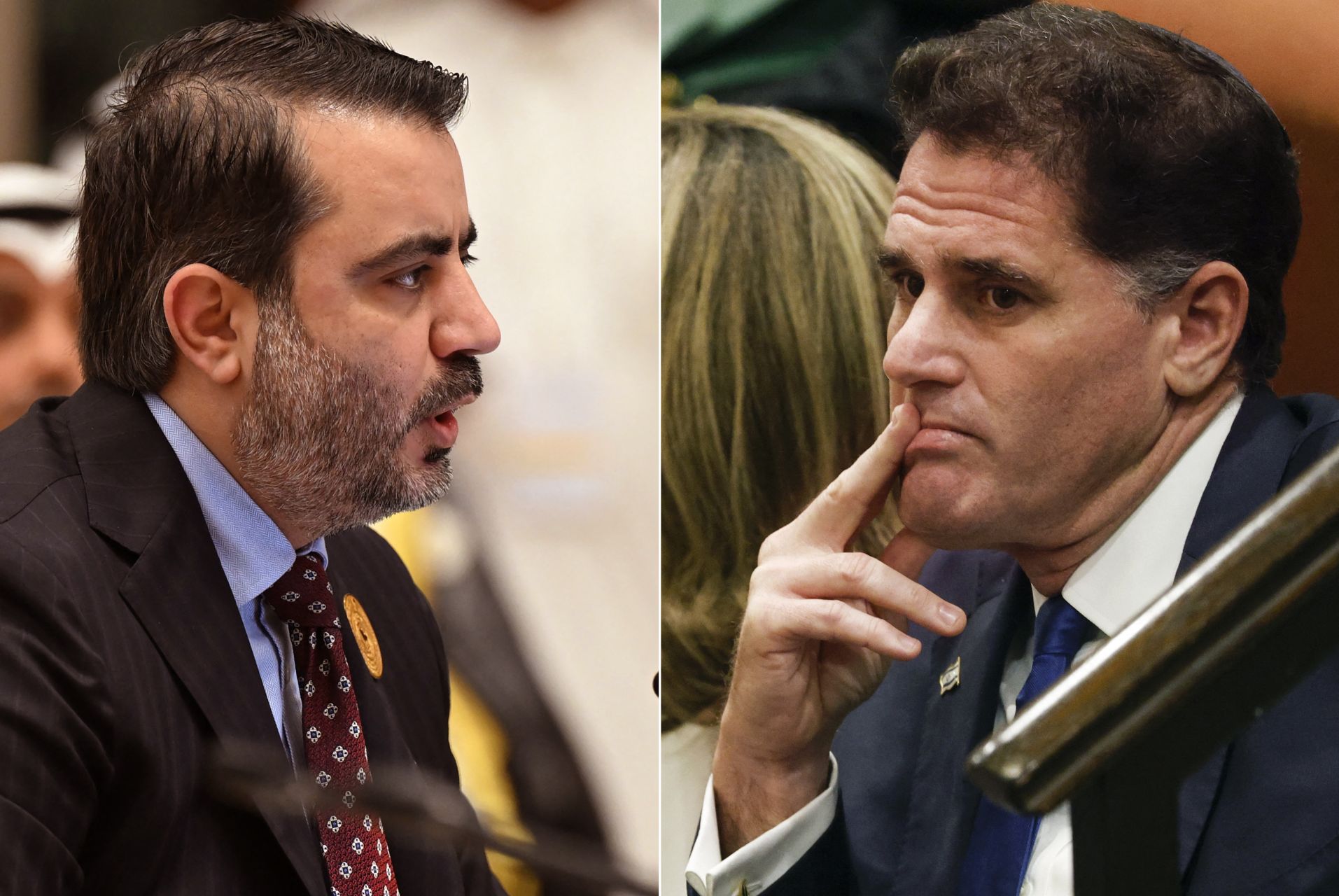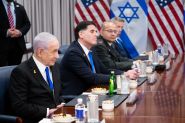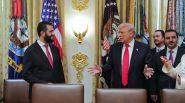- Home
- Middle East
- US-Brokered Israel-Syria Security Deal Possible in September?

This combination of pictures created on July 25, 2025 shows Syrian Foreign Minister Asaad al-Shibani (L) addressing a GCC ministerial council meeting with Syria in Mecca on March 6, 2025 and Israel's Strategic Affairs Minister Ron Dermer attending a special session of the Knesset (Israel's Parliament) in Jerusalem on December 29, 2022. ©AFP
The Trump administration is working to secure a preliminary security agreement between Tel Aviv and Damascus ahead of the UN General Assembly in September, according to Israel National News. A source close to the talks said there is “a real possibility of reaching security arrangements” by then.
Ongoing Talks and Key Players
Syria’s president Ahmad al-Sharaa confirmed to Arab journalists that his government is engaged in “advanced negotiations” with Israel over a security agreement. While he ruled out a full peace deal, he emphasized he “would not hesitate to accept any deal that benefits Syria,” according to the Times of Israel.
Washington is mediating through envoy Thomas Barrack and diplomat Morgan Ortagus, who recently visited Israel and expressed optimism about progress. Several rounds of talks have already taken place in Paris between Israeli Strategic Affairs Minister Ron Dermer and Syrian Foreign Minister Assaad al-Shibani.
Key Points of the Proposed Deal
The agreement is beginning to take shape. According to the Times of Israel, it would demilitarize the Syrian side of the Golan Heights, prohibit weapons that could threaten Israel, and establish a humanitarian corridor to the Druze region of Jebel al-Druze.
In exchange, Washington and its Gulf allies would support Syria’s reconstruction and economic recovery after more than a decade of civil war. The Foundation for Defense of Democracies (FDD) notes that Syria would provide security guarantees in return for these investments.
Druze Minority at the Heart of Talks
A sensitive issue concerns Syria’s Druze minority, mainly in Sweida province. Since Bashar al-Assad’s fall last December, the region has seen rising violence, including clashes between Druze militias and pro-government forces.
Israel stresses that “any new agreement must include tangible measures to safeguard the security and humanitarian needs of the Druze population,” according to Israel National News.
A Defined Syrian Doctrine
Beyond the negotiations, Sharaa outlined his vision in a Tuesday interview with Al Arabiya. He affirmed that his government “rejects any interference in Lebanon’s internal affairs and the notion of a ‘river of fire’ separating Syria and Lebanon.”
He dismissed separatist ambitions, stating, “Any call for secession in Syria would remain a mere dream.” On Israel, Sharaa stressed that Damascus will not go beyond the current security agreement: “We will not consider a peace deal with Israel before adhering to the 1974 agreement.”
Reflecting on the region, Sharaa said, “All nationalist and Islamic ideologies in the region have failed,” describing Syria as “on the brink of a renaissance, strong in itself and through its alliances.”
The proposed agreement goes beyond military issues, forming part of a broader effort to restore Syria’s international standing. The FDD notes that Damascus seeks to rebuild national unity and revive the country after more than a decade of civil war.
In essence, the security arrangement is intended as a bridge toward the diplomatic and economic rehabilitation Syria is actively pursuing.
Uncertainties and Challenges
Despite progress, uncertainties remain. FDD cautions that the details could determine whether the agreement succeeds or fails. Still, it notes that a deal could benefit both countries: Israel could focus on Hamas, Hezbollah, and Iran, while Syria could prioritize its reconstruction.
Significant obstacles persist, including Israeli mistrust of Syria’s new government, partly led by former Islamists, ongoing anti-Israel sentiment among some Syrians, and Iran’s possible perception of the agreement as a threat to its regional influence.
A September Deadline in New York
The UN General Assembly, scheduled for late September in New York, could serve as the stage for a historic announcement. Sharaa and Israeli Prime Minister Benjamin Netanyahu are expected to attend just hours apart. For the Trump administration, the deal would represent a major diplomatic achievement.
A source cited by Israel National News said, “there is a real possibility of reaching certain security arrangements by then.” Yet, between diplomatic optimism and geopolitical realities, the deal’s realization remains dependent on delicate compromises.
Read more




Comments